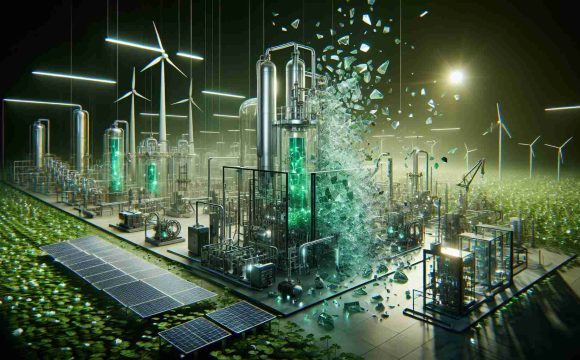The recent re-election of Donald Trump has raised alarms for the clean energy sector in the United States. Known for his climate skepticism, Trump has expressed intentions to prioritize fossil fuels and aims to halt offshore wind projects from the very start of his new term. His campaign featured strong criticism of President Biden’s Inflation Reduction Act (IRA), dismissing it as a misleading scheme and vowing to dismantle it.
The implications of Trump’s return to power are swift and severe. Major renewable energy companies have faced stock declines, with prominent names like NextEra and Sunrun losing significant market value, reflecting reduced expectations for government support for green initiatives. According to experts, Trump’s focus will likely shift toward energy security, conflicting with the goals of renewable energy.
President Biden’s IRA, praised for its contributions to curbing greenhouse gas emissions, allocated substantial funds to promote solar, wind, and nuclear projects, resulting in a surge of private investments. However, Trump’s election casts doubt on the continuity of these programs.
Despite Trump’s assertions against the IRA, analysts suggest that significant cuts to this legislation may face resistance, particularly from Republican legislators worried about the financial impacts on their constituents. As Trump moves forward, the ongoing transition to clean energy appears resilient, fueled by prior investments and pressures for emissions accountability. Challenges remain, but the drive for green energy may not fade easily.
Trump’s Re-Election: The Impact on Clean Energy in the U.S.
Overview
The recent re-election of Donald Trump has sparked significant concerns within the clean energy sector in the United States. With a history of climate skepticism, Trump’s administration is expected to favor fossil fuels over renewable energy sources, bringing uncertainty to ongoing and future clean energy projects.
Implications of Trump’s Policies
Trump’s administration is anticipated to prioritize energy security, which could come at the expense of investments in solar, wind, and other renewable energy initiatives. Reports indicate that following his election, major renewable energy companies, such as NextEra and Sunrun, experienced notable declines in stock value. This reaction reflects broader market apprehensions about the potential withdrawal of government support for green initiatives.
Re-Evaluating the Inflation Reduction Act
President Biden’s Inflation Reduction Act (IRA) is widely recognized for its substantial funding aimed at reducing greenhouse gas emissions and promoting renewable energy projects. Under Biden, the IRA has driven a surge in private investments across the clean energy sector. However, Trump’s campaign has vehemently criticized this legislation, labeling it as a misleading scheme. There is a growing concern that his administration may seek to dismantle key components of the IRA, although pushback from Republican legislators could impede drastic cuts given their constituents’ interests in green investments.
Future Trends in Clean Energy
Despite the potential challenges posed by Trump’s return to power, experts suggest that the transition to clean energy may continue to gain momentum. Recent analysis indicates that prior investments and the increasing demand for emissions accountability across the private sector may buffer the negative impacts of a more fossil-fuel-centric policy agenda.
Use Cases and Innovations in Clean Energy
Several innovative technologies and projects continue to emerge within the clean energy sector, which may have lasting impacts regardless of political leadership. For instance:
– Energy Storage Solutions: Advances in battery technology are making renewable energy sources more viable, allowing for better integration into the energy grid.
– Solar Power Expansion: Community solar projects are gaining popularity, giving residents easier access to clean energy, regardless of their property ownership status.
– Offshore Wind Projects: Although Trump has announced intentions to halt offshore wind initiatives, many states continue to pursue these projects due to their potential for significant energy generation.
Predictions and Market Analysis
Analysts predict mixed outcomes based on Trump’s energy policies. While immediate support for renewable projects may dwindle, the fundamentals of clean energy demands driven by climate change will likely sustain interest in this sector. Companies already invested in clean technologies may pivot to adapt to any regulatory changes, finding ways to innovate and appeal to market demands even amidst potential limitations.
Conclusion
Donald Trump’s re-election presents a complex landscape for the clean energy sector in the U.S. While challenges loom with a potential shift back to fossil fuels, the foundation laid by recent investments and heightened awareness of climate issues may provide a cushion against the worst impacts of policy shifts. The ongoing evolution in the clean energy market will require vigilance and adaptability from stakeholders committed to sustainable practices.
For more insights on clean energy developments, visit Energy.gov.







